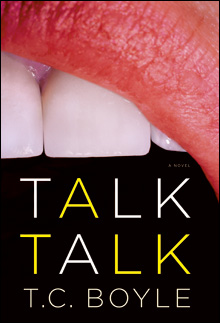T.C. Boyle on America’s identity crisis
By PETER KEOUGH | July 11, 2006

SHALLOW FURY: An engaging novel about identity theft that doesn’t quite pay off. |
What’s in a name? For the identity thief, a fortune; for the victim, a world of woe. At the start of T.C Boyle’s new novel, Dana Halter frets about getting to a dental appointment in time. She runs a stop sign, and all that worry dissipates as she’s arrested for multiple crimes ranging from assault with a deadly weapon to bounced checks. She spends the weekend wearing an orange jump suit in a fetid cell, accosted by winos, hookers, and crazy people. But who’s crazier than the people who’ve put her away? When she arrives in court days later, the truth that should have been obvious to all the stereotypically indifferent and incompetent officials she’s encountered comes out: Dana’s identity has been stolen.What can be more fundamentally American than anxiety about one’s identity? In literature, the theme goes back at least to Edgar Allan Poe. No accident, then, that Boyle names his villain William Wilson, after the wastrel Poe character hounded to death by his doppelgänger. But he also makes Dana deaf, investing her Miranda “right to remain silent” with keen irony. Not only has she lost her identity, she can barely speak. Her voice wavers and quails under stress, and when she signs, she’s at the mercy of interpreters. A life of silent desperation? Hardly. Her isolation only intensifies her anger and determination, as Boyle writes in a prolix description of wordlessness: “She heard nothing. She lived in a world apart, her own world, a better world, and silence was her refuge and her hard immutable shell and she spoke to herself from deep in the unyielding core of it. . . . That they couldn’t touch. No one could.”
 |
Dana engages in the blame game, directing her fury first at the arresting police officer, then at the inept court-appointed translator, then at the judge. Her wimpy boyfriend, the aptly named Bridger, is next in line, until Dana realizes she should be focusing on the thief. He’s a formidable opponent, the most charismatic creep Boyle has created in some time, and he threatens to become Talk Talk’s most appealing character. A lower-class loser with dreams of material success, a crass bastard with a flair for finer things and a passion for cooking, Wilson is a self-made man and then some. He’s mastered the art of inhabiting and discarding the identities of strangers. As Dana, he’s enjoyed showing off her PhD as much as he has maxing out the credit cards he’s taken out in her name. And his rage, sense of victimization, and illusions of entitlement mirror Dana’s own.So the chase is on, with successive chapters alternating points of view from Dana and Wilson and, somewhat irrelevantly, Bridger. Meandering from California to upstate New York, the narrative serves up fast food, coincidences, surreal confrontations, and Boyle’s arch detailing of highway Americana. He shapes his paranoia du jour into an exciting amateur-detective story. What’s missing is the profound payoff. Boyle’s resolution of the basic questions about the American experience turns out to be just more talk talk.
T.C. BOYLE | July 11, 6 pm | Boston Public Library’s Abbey Room, 700 Boylston St, Boston | 617.536.5400 x 2212
 Related
Related:
They're watching you, Bob's your uncle, Off point, More 
- They're watching you
A guide for privacy for Mainers and beyond.
- Bob's your uncle
When was the last time England was relevant at all in the sporting world?
- Off point
Lots of class being shown this year by New York–area point guards.
- It takes an identity thief
In late April 2006, shortly before the hearing to evict his tenant Karen Keester, Lee Gersch received a phone call from Keester’s twin sister, Michelle. She had just gotten divorced, Michelle claimed, and needed to move to Boston from Arkansas for a new job. She suggested that she and her cat could move right into Keester’s Beacon Hill flat.
- ‘An honest story’
As exciting as A Bronx Tale is, its most dramatic moment happened offstage, in 1990 when Chazz Palminteri was performing his one-man show in Los Angeles and turned down a million-dollar deal for film rights because they refused to let him recreate his role in the film.
- The con goes on
David Mamet has always had a professional fascination with confidence men who pretend to be businessmen.
- Sports blotter: Walker wiggle
The last couple of weeks have sucked for Celtics fans.
- Trouble in Iowa
Gross, nasty, disgusting story out of Iowa recently — from Iowa City, to be exact, home of the University of Iowa.
- Appetite for destruction
Well before he gunned down 32 people at Virginia Tech last week, it appears Seung-Hui Cho was obsessed with Guns N' Roses.
- Building better bodyguards
This article originally ran in the May 2, 1978 issue of the Boston Phoenix .
- Republican radio
If you’re a political liberal — or just someone who has a sense of fair play — listening to two straight days of talk on WRKO-AM isn’t easy.
- Less

 Topics
Topics:
Books
, Boston Public Library, Crime, Edgar Allan Poe, More  , Boston Public Library, Crime, Edgar Allan Poe, Identity Theft, Less
, Boston Public Library, Crime, Edgar Allan Poe, Identity Theft, Less 